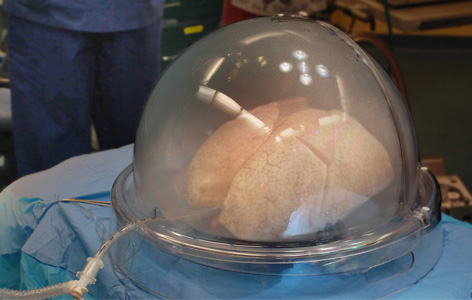Home page Description:
A method for preserving donor lungs offers greater flexibility for transplantation surgeries.
Posted On: December 14, 2016

Image Caption:
Preservation of lungs with ex vivo lung perfusion (pictured above) has led to a 30% increase in transplants at the UHN Toronto Lung Transplant Program.
Donor lungs that are to be used for transplantation have to be preserved outside of the body for assessment and transportation purposes. However, the preservation process only slows tissue deterioration: if lungs are left for too long, damage can occur, making them unusable. At most centres, the maximum acceptable time for this is between six and eight hours.
The results of a new study by TGHRI Scientist Dr. Marcelo Cypel show that using the ex vivo lung perfusion (EVLP) method to preserve lungs can extend this window. EVLP—a technique pioneered by Dr. Cypel and TGHRI Senior Scientist Dr. Shaf Keshavjee—involves continually pumping a mixture of oxygen, proteins and nutrients throughout the organ to mimic normal conditions within the body.
In the study, Dr. Cypel and his research team reviewed the medical records of 906 lung transplant patients. The research team used the data to compare two groups of transplant recipients: those that received lungs preserved using traditional methods, and those that received lungs preserved for more than 12 hours with EVLP. The researchers found no differences between the two groups in terms of short-term injury to the lung, recovery time in the hospital and patient survival up to one year after surgery. The results suggest that EVLP can be used to extend the time that lungs can be stored to at least 12 hours (in some cases up to 20 hours) before surgery without affecting outcomes.
“By making time less of a limiting factor, EVLP allows lungs to be transported greater distances, enables treatment of lungs that would normally be deemed unsuitable for transplantation and provides more time to plan the logistics of the surgery,” explains Dr. Cypel. “It ultimately expands the pool of available organs and enhances the success of transplantation.”
For more information, watch Dr. Cypel discuss his research in this video.
This work was supported by the Toronto General & Western Hospital Foundation. M Cypel is a Canada Research Chair in Lung Transplantation.
Yeung JC, Krueger T, Yasufuku K, de Perrot M, Pierre AF, Waddell TK, Singer LS, Keshavjee S, Cypel M. Outcomes after transplantation of lungs preserved for more than 12 h: a retrospective study. Lancet Respir Med. 2016 Nov 17. doi 10.1016/S2213-2600(16)30323-X.
The results of a new study by TGHRI Scientist Dr. Marcelo Cypel show that using the ex vivo lung perfusion (EVLP) method to preserve lungs can extend this window. EVLP—a technique pioneered by Dr. Cypel and TGHRI Senior Scientist Dr. Shaf Keshavjee—involves continually pumping a mixture of oxygen, proteins and nutrients throughout the organ to mimic normal conditions within the body.
In the study, Dr. Cypel and his research team reviewed the medical records of 906 lung transplant patients. The research team used the data to compare two groups of transplant recipients: those that received lungs preserved using traditional methods, and those that received lungs preserved for more than 12 hours with EVLP. The researchers found no differences between the two groups in terms of short-term injury to the lung, recovery time in the hospital and patient survival up to one year after surgery. The results suggest that EVLP can be used to extend the time that lungs can be stored to at least 12 hours (in some cases up to 20 hours) before surgery without affecting outcomes.
“By making time less of a limiting factor, EVLP allows lungs to be transported greater distances, enables treatment of lungs that would normally be deemed unsuitable for transplantation and provides more time to plan the logistics of the surgery,” explains Dr. Cypel. “It ultimately expands the pool of available organs and enhances the success of transplantation.”
For more information, watch Dr. Cypel discuss his research in this video.
This work was supported by the Toronto General & Western Hospital Foundation. M Cypel is a Canada Research Chair in Lung Transplantation.
Yeung JC, Krueger T, Yasufuku K, de Perrot M, Pierre AF, Waddell TK, Singer LS, Keshavjee S, Cypel M. Outcomes after transplantation of lungs preserved for more than 12 h: a retrospective study. Lancet Respir Med. 2016 Nov 17. doi 10.1016/S2213-2600(16)30323-X.




